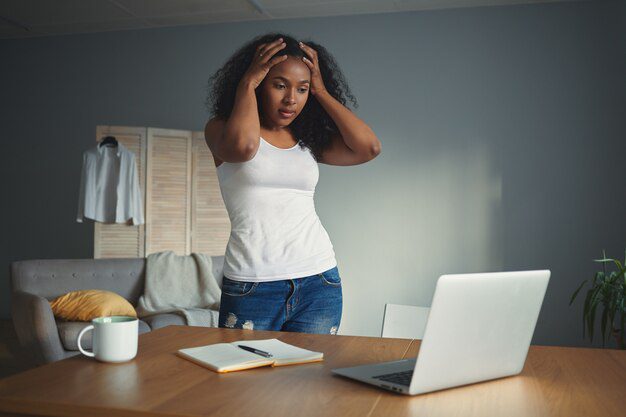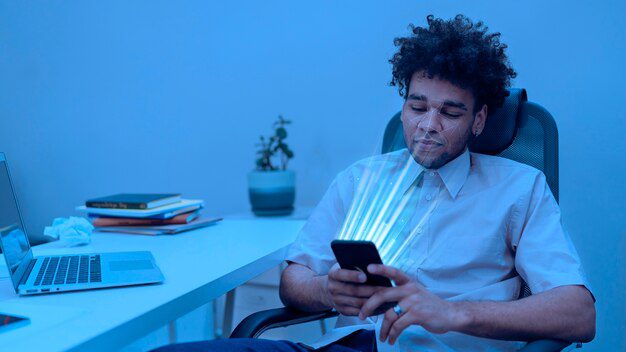This content is for informational and educational purposes only. Always consult a qualified healthcare provider.
Last Updated on November 22, 2024 by Grace Oluchi
We live in a world where we can do so many things online, the digital age has brought so many benefits, including more connectivity, access to information, and improved communication. However, it has also created issues by introducing new sources of stress, and anxiety that can have a significant impact on our mental and physical well-being.
AKA the need to do everything and be everything
To manage stress and anxiety in the digital world, one would need to apply a thoughtful approach when dealing with technology. With the constant presence of smartphones, social media, and other digital tools, it’s easy to get caught up. Getting caught up can lead to things like poor sleep quality or sleep apnea, procrastination, and social comparison.
In this article, we’ll be taking a closer look into the common key stressors associated with the digital age, and review healthy ways to manage them.
📋 Table of Contents
Key takeaway
While technology has made things easier, the cons cannot go unnoticed. Tech is great, really great, but it’s equally important to protect your mental health, and use it wisely. Therefore, to reduce your risk of experiencing depression, and anxiety, it’s essential you learn the simple ways of managing the stressors that come with the digital world.
What are the issues that come with the digital age?


Here are some key stressors you need to be aware of
Constant distraction
Let’s face it, it’s really easy to get distracted by technology. The constant notifications, and alerts from your devices can make it a tad bit harder to focus and relax. Why? Because you’ll always feel the need to check your phone, especially when your source of income is deeply embedded in technology. It might seem impossible to take a break, or not pay much attention to your phone or computer. Research has shown that frequent distractions can lead to increased stress levels, less productivity, and reduced attention span.
Poor sleep patterns
Sleep dysregulation is highly linked to exposure from screens and the constant notifications we receive. They can interfere with our sleep patterns, which leads to fatigue, grogginess, anxiety and depression. It’s quite sad to think about it. The blue light emitted from screens can suppress the production of melatonin, the hormone responsible for regulating sleep patterns.
When you don’t get enough sleep for a few days, it’ll show in your eyes, on your skin, and your mood and energy levels. Sleep deprivation can lead to increased irritability which can cause you to be in frequent bad moods. Which ends up affecting your relationship with those around you, and can cause you to be less productive.
Sleep Your Way to Better Health: Understanding the Importance of Restful Sleep.
Social comparisons
Yup social media, you can never see the end of it, something new keeps happening and well…. You want to catch the next trend, you want to join, you just want to witness it all. But it is not that simple, and can have adverse effects on your mental health. Social media platforms showcase the highlight reels of other people’s lives, which makes it easy to compare and feel inferior. Even if you don’t want to, or mean to, it will happen. Excessive use of social media can lead to increased symptoms of depression, anxiety, and loneliness.
Work/life balance
As I mentioned earlier, it can be hard to find some form of mental relaxation, especially when your work is online related. The constant availability of work emails, and messages can blur the lines between work and personal life. As you’d have to do everything and be involved with everything online. Which then leads to burnout, and stress. In this digital age, many people tend to check work emails or information outside of work hours. And research has found that those who do this are more likely to suffer from burnout and decreased job satisfaction.
Sometimes you just want to be away from your phone or anything related to the digital age, but you can’t.
FOMO (fear of missing out)
The fear of missing out on social events, news, or updates can incite feelings of anxiety, and inadequacy. And it can be tiring. You don’t want to miss out on that instagram live, giveaway, party and others. Therefore when do miss out on them, you could start to experience increased stress levels, decreased self-esteem, and reduced life satisfaction.
However, you don’t have to drown yourself in the process, because there is a way to navigate the digital age more strategically.
Strategies for managing stress and anxiety in the digital age
You can protect yourself and not suffer from unnecessary stress by taking certain measures.
1 . Set boundaries
How do you set boundaries in a digital world? By establishing clear boundaries between your work and personal life, and prioritize self-care routines. Some top steps to follow include:
- creating specific work hours
- avoiding work-related tasks during personal time
- engaging in activities that bring you joy and relaxation
You must affirm your boundaries else you will keep living in the same loop.
2 . Practice mindfulness
Many times I’ve talked about how essential mindfulness is, to your mind and body. Regular mindfulness practice can help reduce stress and anxiety by increasing self-awareness and encouraging relaxation. Some common activities to include are meditation, deep breathing, or yoga. You can do them in the morning, afternoon or evening. So long as you’re taking care of your mind and body, and doing it realistically and calmly, you’ll be fine.
3 . Use the digital age wisely
If you want to stay afloat in the digital age, you need to use technology wisely. Using something too much may not be good for you, it’s important that you find ways to limit your usage of technology. You can utilize apps and tools that promote mindfulness, relaxation, and focus, and set limits on screen time and social media usage. Some helpful apps you can use are Calm, Headspace, or Freedom.
4 . Go on a regular digital detox
Sometimes go offline, even if it’s just for a day, it can help a lot. Pick days where you don’t chat with anyone, look at your socials or watch things online. Allow your brain rest, and focus on other things like reading a book, drawing, cleaning, declutterring, or spending time outside. The world around you is there for exploration, so sometimes explore it and give it a little more attention. It feels much better and is more rewarding to your mental health.
There is more to life than the accounts you follow on social media.
5 . Prioritize sleep
Don’t joke with your sleep schedule, it’s important that you create a consistent sleep routine, and avoid screens before bedtime. When you intentionally keep screens away from you before bedtime, you’ll end up creating a relaxing bedtime routine. Within 30 minutes to an hour before bedtime, try stretching, reading a book, journaling, or (optional) listening to soothing music. Avoid the temptation to continue chatting with friends or relatives, or your partner, remember that you can always reach out tomorrow.
Check out these amazing articles:

